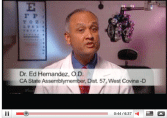After wrangling with ophthalmology, many legislative stops and starts, Web site propaganda, a YouTube video, and tens of thousands of dollars for lobbying efforts on both sides of the issue, California O.D.s can finally provide glaucoma treatment without jumping through hoops and holding an ophthalmologists hand.
This was the result when Gov. Schwarzenegger signed the California Access to Vision Bill (S.B.1406) on September 26.
The new law is an overhaul of legislation passed in 2000. The 2000 legislation was a Pyrrhic victory for California O.D.sthey gained the right to treat primary open-angle glaucoma (POAG), but had to satisfy many restrictions.
Among its many limitations, the 2000 law required O.D.s to:
Take a 24-hour didactic course on glaucoma.
Collaborate with an ophthalmologist on 50 POAG patients, who had to be newly diagnosed by the optometrist.
Obtain approval from the ophthalmologist for any treatment or change in treatment.
Apply for certification after treating 50 newly-diagnosed POAG patients, which required verification by the consulting ophthalmologist.
In eight years, only 132 of the states 6,000 licensed O.D.s obtained this certification to treat glaucoma.
Most importantly, the lack of primary eye care has led to inadequate access to care for many glaucoma patients and twice the doctor visits (to the O.D. for the initial visit, and then the ophthalmologist for confirmation) for other glaucoma patients, argued Sen. Lou Correa, who introduced the new legislation along with Sen. Sam Aanestad, an oral surgeon.
Since its introduction on February 21, S.B.1406 was hotly debated in both the legislature and in the public eye. In the legislature, it was analyzed in several committees, argued on the Senate floor, and amended more than half a dozen times. Web sites both promoted the bill (www.my-eyedoc.com) and denounced it (http://NoOnSB1406.org). The California Optometric Association (COA) even produced a videoviewed more than 2,200 times on YouTubethat explained the need for the bill to the public.

A YouTube video about S.B.1406 explained the bill to the public.
New Scope for The new scope of practice legislation in Expand glaucoma treatment to include exfoliation glaucoma and pigmentary glaucoma. Include oral medications to treat glaucoma. Automatically certify O.D. graduates (starting May 2008) to treat glaucoma. Grandfather in those O.D.s who are already glaucoma certified. Certify by advisory committee other O.D.s to treat glaucoma. Eliminate the requirement to comanage 50 glaucoma patients with an ophthalmologist. Eliminate the requirement to obtain an ophthalmologists approval to begin or to change treatment. Allow unrestricted use of anti-allergy drugs, topical and oral antibiotics, topical and oral antivirals, oral non-steroidal drugs, and other TPAs. Allow minor procedures, such as most foreign body removals, corneal scraping with cultures, debridement of corneal epithelia, mechanical epilation, venipuncture for diabetes testing and expression of sebaceous cysts. Allow punctal occlusion by plugs. Allow lacrimal irrigation and dilation.
In the end, the new legislation satisfies the two main priorities that California O.D.s wanted: eliminating the glaucoma certification requirement and lifting many restrictions on therapeutic drugs, says Tim Hart, the COAs Director of Government and External Affairs.
Allow O.D.s to order tests and imaging, such as smears, cultures, sensitivities, complete blood count, X-rays, and others.
Licensed optometrists who graduated on or after May 1 this year will be automatically certified to treat glaucoma. The legislation also calls for the formation of a new advisory committee to recommend didactic and case management curricula requirements for already-licensed optometrists who want to treat glaucoma. The six-member panel will be comprised of three ophthalmologists and three optometrists; their recommendations will be reviewed next year by the Office of Examination Resources (OER) in the California Department of Consumer Affairs. The State Board of Optometry will translate OERs findings into final regulations.
The legislation goes into effect January 1, 2009 and the glaucoma certification standards process must be completed by the end of the year.

